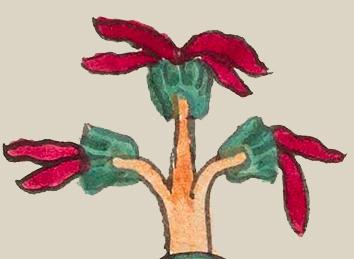huaxin (Mdz7v)
This element has been carved from the compound glyph for the place name, Huaxtepec. The main component of the place name is the huaxin or, in Mexican Spanish today, the guaje, a tropical tree with edible pods. The trunk is painted orange, the color usually used for wood. The three branches have greenery, and out of the greenery emerge two red pods per branch.
Stephanie Wood
There are two plants that are called guajes in Mexico today. One is a vine and the other is this acacia tree of the Leguminosae family, native to Mexico and Central America. The tree produces long pods that contain edible seeds that are "eaten raw, toasted or ground into a sauce called guaxmole [i.e. huaxmolli]"--at least in the Huasteca, according to Alec Dempster, Lotería Huasteca (2015), p. 62. They are also mixed with beans or put in tacos. Each pod has about 20 seeds (a good number for Mesoamerican math!), and they are slightly smaller than beans. The red pods were harvested and bundled, as shown in the Florentine Codex, vol. 3, book 11, chapter 6. One can see a photo of the red seed pods, with their green interiors and green seeds, here: https://jaliscocina.com/los-guajes-alimento-de-familias-humildes. When dried, the seed pods can be shaken like a rattle or an instrument for keeping rhythm.
Stephanie Wood
c. 1541, but by 1553 at the latest
Stephanie Wood
hoatzin, hoaxin, uaxin, uachi, huachi, guaje, huaje, crótalos

tropical tree with edible pods
el guaje, árbol tropical con vainas comestibles
Stephanie Wood
Codex Mendoza, folio 7 verso, https://digital.bodleian.ox.ac.uk/objects/2fea788e-2aa2-4f08-b6d9-648c00..., image 25, of 188.
The Bodleian Libraries, University of Oxford, hold the original manuscript, the MS. Arch. Selden. A. 1. This image is published here under the UK Creative Commons, “Attribution-NonCommercial-ShareAlike 3.0 License” (CC-BY-NC-SA 3.0).

